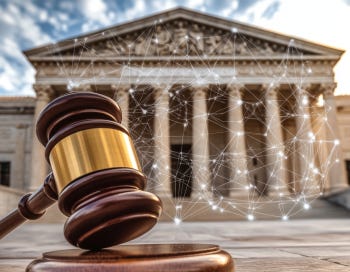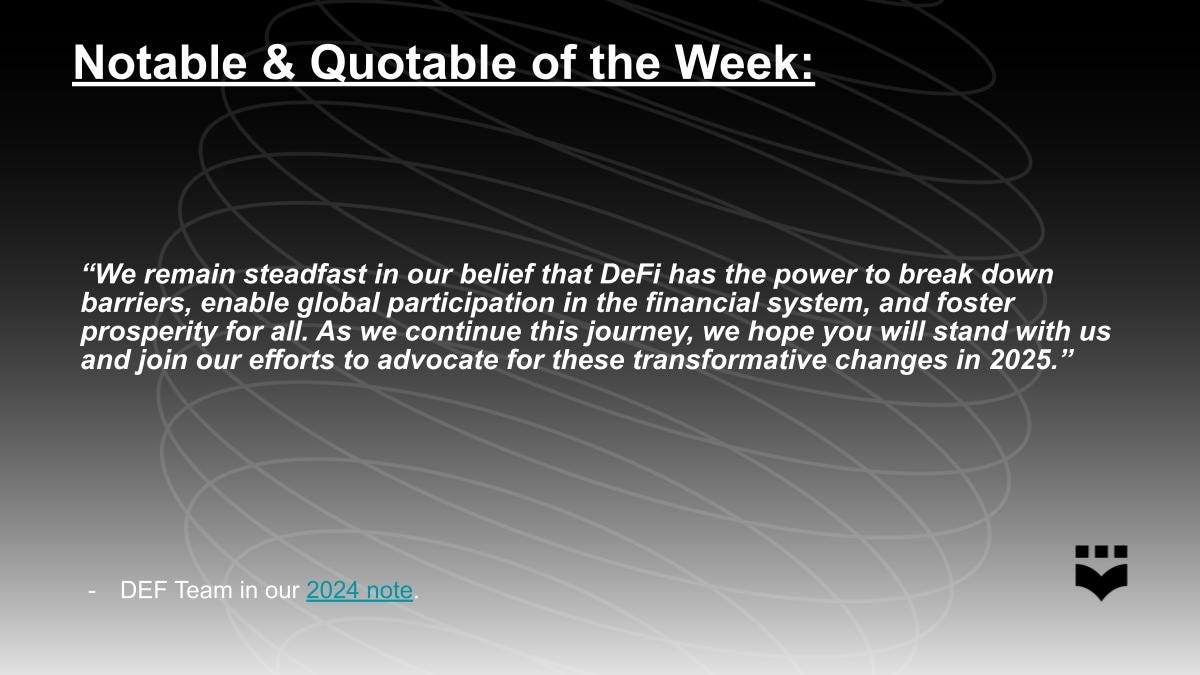IRS Finalizes “Broker” Rulemaking and DEF Sues; More Personnel Shifts in DC; Coinbase Interlocutory Appeal Certified
Happy 2025! Without further ado, here is the first DEF Weekly of the year:
IRS Finalizes “Broker” Rulemaking and DEF Sues
What happened?
On December 27th, the Treasury Department’s Internal Revenue Service (IRS) finalized the “broker” rulemaking that requires DeFi market participants who, according to the IRS, facilitate digital asset sales via front-ends on DeFi protocols to report gross proceeds and provide payee statements for user transactions. The regulations mandate the insertion of intermediaries where they do not exist and the collection of sensitive information on customers and their transactions in a noncustodial setting. The finalized rule is so broad as to capture any service that is supposedly “assisting customers in initiating” a transaction as a “broker,” including front-ends and even web browsers, and internet-service-providers (ISPs). The rule fundamentally exceeds the Treasury’s statutory authority, disregards the technological realities of DeFi, and would violate the privacy of millions of DeFi users.
The final regulations are supposed to implement amendments to Section 6045 of the Internal Revenue Code made by the Infrastructure Investment and Jobs Act and aim to clarify the definition of a “broker” to encompass activities in the digital asset ecosystem. Congress considered including noncustodial participants in the legislation but ultimately decided not to do so because of the crucial differences between noncustodial software providers and traditional financial services intermediaries. The Treasury finalized a “broker” rule for custodial market participants in June, leaving DeFi out of the rule and stating they would revisit at the end of the year.
In December, former House Financial Services Committee Chairman Patrick McHenry (R-NC) penned a letter to the Treasury urging them not to finalize last-minute rulemakings and cautioning that the Congressional Review Act (CRA) could be used to remove them if finalized. During the rule’s comment period, DEF and numerous members of the public warned the IRS and Treasury that moving forward with the rule would cripple the digital asset industry. But the government ignored this feedback, leaving the digital asset sector with a rule that puts unlawful compliance burdens on software developers who build so-called “trading front-end services.” In DEF’s comment letters on the proposed rule, we noted significant objections on the record with regard to Treasury’s overly broad definitions of “broker” and “digital asset middlemen”; the immense multi-billion-dollar compliance burden of the rule, and privacy concerns.
DEF, Blockchain Association (BA), and Texas Blockchain Council (TBC) filed a lawsuit against the Treasury for violations of the Administrative Procedure Act (APA) and the U.S. Constitution on the same day the rule was finalized, in order to ensure that our objection is on the record.
The lawsuit makes the following claims:
The Treasury Department acted “in excess of [its] statutory jurisdiction, authority, or limitations” given to it by Congress by fundamentally redefining the term “broker” beyond the text of 26 USC § 6045(c)(1). The statute defines a broker as “any person who (for consideration) is responsible for regularly providing any service effectuating transfers of digital assets on behalf of another person,” which clearly does not include front-ends or DeFi protocols.
The rulemaking is arbitrary and capricious because it failed to “articulate a satisfactory explanation for [its] actions” or establish a “rational connection between the facts found and the choice made.” Additionally, the Treasury did not address significant points raised in public comments, thereby violating the APA.
The rule violates the 4th Amendment’s protection against unreasonable search and seizure without probable cause and the 5th Amendment’s Due Process Clause, which requires fair notice of forbidden conduct and standards to prevent discriminatory enforcement, rendering it impermissible under the APA.
What does this mean?
This midnight rulemaking will stifle innovation and burden American entrepreneurs—if it stands. As DEF’s CEO Miller Whitehouse-Levine stated, “Decentralized Finance promises to make financial services and the digital economy more accessible, efficient, interoperable, dependable, and consumer-focused — this promise is at the heart of our work at the DeFi Education Fund. This unfortunate rulemaking is a direct threat to financial innovation, and we intend to fight it using every tool available to us.” That’s why DEF, BA, and TBC teamed up to put our objection on the record.
Moving forward, we hope that Congress will use the Congressional Review Act to officially disapprove of the rule, stopping it from going into effect. DEF will continue to work to protect DeFi innovation and protect users and developers in the ecosystem.
More Personnel Shifts in Washington
What happened?
Over the past few weeks, there have been a flurry of shifts in leadership as the federal government gears up for a new legislative session and administration.
SEC
After a heated last-minute effort to re-nominate Commissioner Caroline Crenshaw (D) to the Securities and Exchange Commission (SEC)—a vocal critic of crypto—and significant pushback from the crypto community, her re-nomination was ultimately withdrawn. Due to the pending resignations of SEC Chair Gary Gensler (D) and Commissioner Jaime Lizarraga (D), President-elect Trump will now be able to appoint three new members to the Commission in the immediate future. President-elect Trump has already announced the nomination of pro-crypto Paul Atkins (R) to be the new Chairman of the SEC.
CFTC
Last week, Commodity Futures Trading Commission Chairman Rostin Benham (D) announced his planned resignation from the Commission effective January 20th. President-elect Trump will designate a new Chair of the Commission as well as appoint a replacement for the vacancy.
Federal Reserve Board
Last week, Michael Barr, Vice Chair of Supervision at the Federal Reserve Board, announced his resignation from the position. He will remain a Federal Reserve Governor until his term expires in 2032, meaning that there will be no new vacancy on the seven-member board of governors. Since Barr is staying on as a Fed Governor, President-elect Trump will select a new Vice-Chair for Supervision from among the current group of governors. The Fed stated that they will not make any “major” rulemakings until a successor is confirmed by the Senate.
The 119th Congress
On January 3rd, the 119th Congress was sworn in, becoming the most pro-crypto Congress ever. There are now 298 crypto-friendly Members in Congress, a positive signal for what’s to come during this legislative session. In the House, Representative French Hill (R-AR) assumed his position as Chairman of the House Financial Services Committee (HFSC) after serving as Chairman of the Digital Assets Subcommittee. Chair Hill recently stated that he plans to pass crypto market structure legislation as a top priority in the new year and is also focused on stablecoin legislation. Last week, Chair Hill also announced the selection of Representatives Bill Huizenga (R-MI) to be the Vice Chair of HFSC, and Brian Steil (R-WI) to Chair the Digital Assets Subcommittee.
In the Senate, Senator Tim Scott (R-SC) is taking the helm of the Senate Banking Committee and has committed to working to create regulatory clarity for the crypto industry. He has also established the Senate’s first ever Digital Assets Subcommittee, which will be chaired by Senator Cynthia Lummis (R-WY).
What does this mean?
As we mentioned in our 2024 Year in Review, the tide is turning for crypto in Washington. These shifts in leadership are a positive signal for the crypto industry and represent promising movement in the regulatory landscape. With a more favorable Congress, paired with strong Committee and Agency leadership in digital assets, 2025 is looking like a positive year for crypto in Washington.
Coinbase Interlocutory Appeal Certified
What happened?
On Tuesday, January 7th, the District Court for the Southern District of New York certified Coinbase’s motion for interlocutory appeal in the SEC’s enforcement action against the firm. The SEC alleges that Coinbase operates an unregistered broker, exchange, and clearing agency in violation of federal securities law. Coinbase moved to certify its interlocutory appeal from the district court’s March 27, 2024 Order granting in part and denying in part Coinbase’s motion for judgment on the pleadings.
An interlocutory appeal is an appeal of a ruling made by a trial court before the case has been resolved. They are allowed when, in the district court’s discretion, the court’s ruling involves a controlling question of law, the resolution of which would “materially advance the ultimate termination of the litigation.”
After a district court certifies a motion for interlocutory appeal, the party seeking the appeal must file a petition for permission to appeal with the Circuit Court of Appeals within 10 days of the certification. The circuit court will then review the petition and decide whether to accept the appeal; it has discretion to deny it even if certified by the district court.
In certifying Coinbase’s motion, the district court held that the reach and application of the Howey test, as it applies to digital asset transactions intermediated by Coinbase, presents a controlling question of law, the resolution of which would “advance the ultimate termination of the SEC’s enforcement action.” Here, the court found that the central question was “whether Coinbase intermediated transactions involving investment contracts, and thus securities.”
With the motion certified by the district court, Coinbase will now petition the Second Circuit to accept the appeal.
Additionally, the district court stayed the case pending resolution of the appeal. This means all proceedings at the district court level are paused until the Second Circuit Court of Appeals either (1) refuses to accept the appeal, or (2) accepts the appeal and renders a decision.
What does this mean?
Should the Second Circuit accept the appeal, the court’s ultimate decision could have significant implications for the industry, depending on its scope. A ruling on how the Howey test applies to the secondary market sale of digital assets would provide much-needed clarity on whether certain transactions fall within the scope of federal securities law.
Right before Christmas, as we have in the past, DEF released our year in review. Be sure to check it out at the link.



